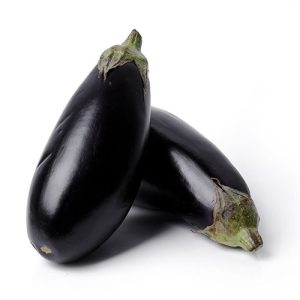Aubergine
Good for diabetics
As brinjals are low in carbohydrates and high in fiber content, they are identified to be good for people suffering from diabetes. It is because, the high fiber causes help in managing blood sugar levels in the body by controlling the absorption of glucose from food.
Control High Blood Pressure and Cholesterol
Eggplants consists of huge amount of magnesium, potassium, calcium and phosphorous. All these minerals help in maintaining electrolyte balance in the body. It also helps in neutralizing the effects of sodium on the body thereby helping in blood pressure control. Apart from this, increased intake of anthocyanins which is present in considerable amounts in brinjal also lowers your blood pressure.
It also has chlorogenic acid that acts as a powerful antioxidant agent, lowering cholesterol levels in the body. Brinjal also comprises high amounts of fiber which increases the absorption of blood cholesterol by the liver to produce bile.
Birth defect prevention
As we all know that Folates are vital parts of any diet, and folic acid is mainly beneficial for pregnant women. Folic acid directly defends infants from neural tube defects that can manifest in a number of ways. Therefore, it is always suggested that expecting mothers increases their folic acid intake to account for their other dependent mouth inside! Eggplants are rich sources of folic acid, which makes a delicious and useful snack or dietary addition when pregnant.
Bone health
Regular consumption of Eggplant is extremely beneficial for managing high risk of bone degradation and osteoporosis. Phenolic compounds give coloration to several fruits and vegetable and this compound have been related with the reduced chance of osteoporosis and makes bones strong and robust. Eggplants consist of significant amounts of iron and calcium, which are essential to bone health and complete strength. Lastly, the quantity of potassium in eggplants helps in the uptake of calcium, making eggplants a widespread and highly beneficial booster for osteoporosis and bone health.
Weight loss
As mentioned earlier eggplant contains almost no fat or cholesterol, therefore it is among the healthy food for all those people who are attempting to lose weight or battle obesity problems. The fiber content is also very satisfying, which prevents the release of ghrelin, the hormone which convey message to our mind that we are hungry again. Simply by reducing our appetite, the chances of overeating are greatly reduced; therefore, weight loss attempts are more successful.
Digestion
Like many other vegetables, eggplant is also one of the greatest sources for dietary fiber, a compulsory element in any balanced diet. Fibers are extremely important for gastrointestinal health, as well as for the consistent movement of the bowels. Fiber helps to bulks up your bowel movements so they pass more easily through the digestive tract, while also encouraging peristaltic motion, the contraction of the smooth muscles that move food through the body. Finally, fiber encourages the secretion of gastric juices which facilitate absorption of nutrients and the processing of foods.
Anemia
Iron deficiency is extremely dangerous to overall health, and it can manifest in anemia. Anemia is described by headaches and migraines, weakness, depression, fatigue and cognitive malfunction. Consuming food high in iron can help to combat anemia, and eggplants consists of considerable amount of iron in their meaty, edible fruit. Similarly, Eggplants are very rich in copper, another essential component of red blood cells, just like iron. Without these two minerals, the red blood cell count in the body will continue to decline. With healthier, red blood cells flowing through your veins, you will see a noticeable boost in energy and strength, and exclude feelings of fatigue or stress.
| Calories 198 | Calories from Fat 12 |
| % Daily Value* | |
| Total Fat 1.3g | 2% |
| Saturated Fat 0.3g | 1% |
| Trans Fat 0g | |
| Polyunsaturated Fat 0.5g | |
| Monounsaturated Fat 0.1g | |
| Cholesterol 0mg | 0% |
| Sodium 5.7mg | 0% |
| Potassium 696mg | 20% |
| Total Carbohydrates 49g | 16% |
| Dietary Fiber 14g | 56% |
| Sugars 18g | |
| Protein 4.7g | |
| Vitamin A | 4.2% |
| Vitamin C | 12% |
| Calcium | 2.6% |
| Iron | 7.9% |
| *Percent Daily Values are based on a 2000 calorie diet. | |
| Reference: www.nutritionix.com | |




